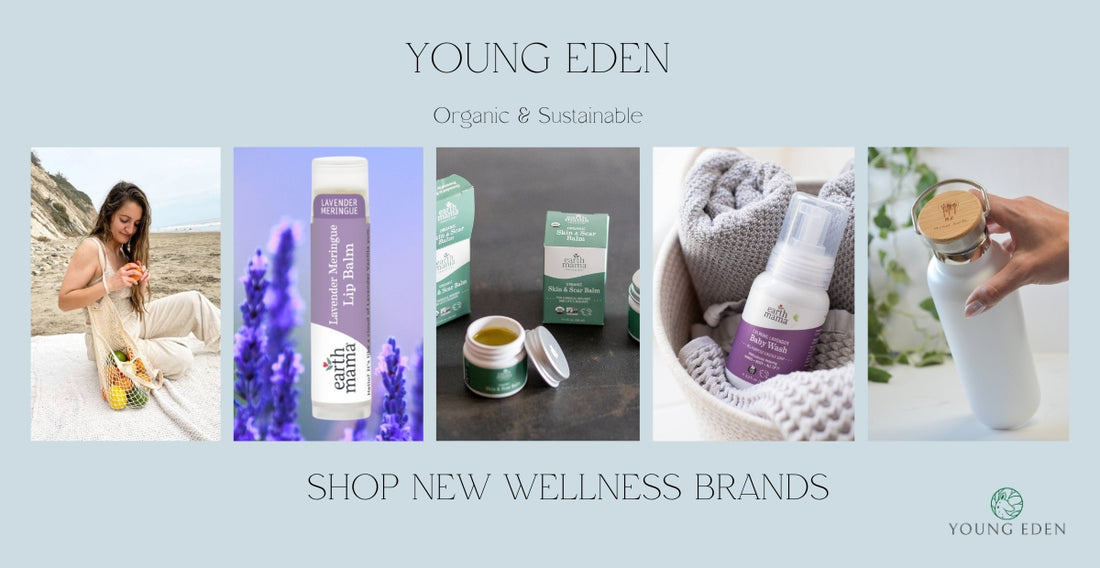
Young Eden Adds New Wellness Products by Earth Mama Organics & Me Mother Earth
Share
Certified and cruelty free organic skincare and reusable, nonplastic, accessories now available.
Today Young Eden, the first-of-its-kind sustainable fashion marketplace, added a variety of new eco-friendly wellness products made by two industry leading brands, Earth Mama Organics and Me Mother Earth, available to shop immediately. Explore the products in Young Eden’s Wellness Collection.
Among the new additions are Earth Mama Organics' lauded lines of industry certified organic lip balms, baby washes, eczema cream, and scar balm, priced between $4-$27.

Earth Mama is a skincare company founded in 2002 by an herbalist and nurse.

Its products are made with certified organic ingredients and are safe for use by anyone including expectant mothers and infants.

Earth Mama Organics is one of the few companies that offers an impressive roster of industry verifications of its high product quality, ranging across organizations including the EWG, Oregon Tilth, Leaping Bunny, Non-GMO Project, EarthKosher, The National Eczema Association, and PlasticNeutral.
Additionally, new products from Me Mother Earth include the company’s line of reusable GOTS certified organic cotton mesh market bags and stainless steel water bottles with bamboo lids, priced between $14-$30.
Me Mother Earth manufactures earth-friendly lifestyle products to help reduce plastic waste.
Why We Must Reduce Reliance on Plastic – for the Environment and Our Health
On average, American households bring home as much as 1,500 plastic bags per year, however, only less than 1% are recycled. Reusable shopping bags offer the benefit of reducing the use and waste of plastic bags that litter our oceans and endanger marine life, while also being more resilient and long-lasting than single-use bags, ultimately saving you money.
The plastic water bottles many of us drink from are made from petroleum, a crude oil or fossil fuel. In the U.S alone, it takes 1.5 million barrels of oil to meet demands for bottled water. Stanford’s School of Sustainability reported that fossil fuels drove 37 billion tons of global carbon dioxide emissions out of the total 40 billion tons measured in 2023.
It is estimated that 1,500 plastic bottles end up as waste in landfills or thrown in the ocean every second.
Switching to glass or stainless steel water bottles rather than plastic can also be a physically healthier alternative for you and your family.
In January, the Proceedings of the National Academy of Sciences (PNAS), a peer reviewed journal of the National Academy of Sciences (NAS), released a study that found three popular brands of bottled water sold in the United States held between 110,000 and 370,000 microplastic and nanoplastic particles per liter of water.
In 2022, the National Library of Medicine studied the exposure routes of microplastics to identify hazards on human health and found that, “oral intake is the most evaluated and common route through which humans are exposed to nanoplastics,” citing our drinking water and food consumption of organisms and materials exposed to nanoplastics.
One of the many reasons we at Young Eden advocate for certified organic cotton clothing is to curb the health dangers and environmental damage associated with synthetic fabrics like nylon and polyester shedding roughly 500,000 microplastics per year (which we ultimately consume) via laundry wastewater.
According to research director, Jane Houlihan, at Healthy Babies, Bright Futures, an alliance of nonprofits, scientists and donors committed to reducing babies’ exposures to neurotoxic chemicals, the new PNAS study offers an opportunity to further explore potential risks of nanoplastic particles to human health.
“They suggest widespread human exposures to minuscule plastic particles posing largely unstudied risks,” Houlihan told CNN. “Infants and young children may face the greatest risks, as their developing brains and bodies are often more vulnerable to impacts from toxic exposures.”
Keeping all of this in mind, the takeaway here is to reduce your exposure to plastic.
“We can avoid consuming foods and beverages in plastic containers. We can wear clothing made from natural fabrics and buy consumer products made from natural materials,” Houlihan said. “We can simply take stock of the plastic in our daily lives and find alternatives whenever feasible.

